Macau is an excellent place from the point of view of feng shui and other mythical beliefs. Macau is known as lin fa tei, "the land of the lotus" and a large portion of the territory's benefits are due to protection from the goddess Kun Iam. Master Luk Ku, a geomancer, claims that Kun Iam, who by tradition rests on a lotus flower and is attracted to anything soft, regards Macau as her chosen spot given the close link between the peninsula, water and mud. According to the same geomancer, Macau benefits from the dragon line which originates in Chung San in the People's Republic of China and concentrates the larger part of its energy in the region of Ma Kok Temple in Macau.
The world is covered with dragon lines, particularly in those areas most affected by positive influences. The Macanese writer Luís Gonzaga Gomes gives several examples of Macau's dragon lines in his works, but the most important line appears to be the one whose head is represented by Penha Hill.
According to the legend as described by Gonzaga Gomes, the body of the mythical animal stretched across the neighbouring Chinese island of Lappa, arching into the Chinese mainland and resting its tail beside the Border Gates on the northern section of the peninsula. When the Avenida Almeida Ribeiro was opened, cutting straight across the peninsula like a knife, the dying dragon rolled over and in doing so lost a leg. The mythical animal thus became incapable of maintaining good relations with other dragons. Although the dragon was dying at that point, there are people who claim that its pulse can still be felt and that its dying breaths can still produce beneficial effects, capable of making the territory a new El Dorado.
Another story told by Gonzaga Gomes is an excellent example of the way communities take note of the smallest details of their natural surroundings:
"Due to the belief in feng shui," wrote Gonzaga Gomes, "the Chinese did not dare to live in the part of the city known as Avenida da República, a waterside road facing Taipa Island." The author claims that "the Chinese thought the wealth of that zone would be threatened by a supposed chicken's beak, a piece of land which jutted out from the coastline of Taipa, which was regarded as a beak due to its wrinkled outline. If the beak had faced towards another point, all would have been well. Unfortunately, however, this was not the case. The damaging beak was ominously placed in exactly the direction of the Avenida da República and threatened to reduce anyone who dared to live there to the direst poverty, as any wealth which could be accumulated would be gradually pecked away."
Consequently, the inhabitants of the city placed a statuette of the goddess Kun Iam at the foot of Penha Hill, beside the road "in the hope that her cloak would avert any malign influences from the unlucky chicken's beak". As additional help against the "aggression from Taipa, the people discovered that the section of Penha Hill which faces Taipa is like a lion's head. In order to revive the sleepy animal, they placed two lights on the slope of the hill to look like the lion's eyes. It was only then, they say, that the Avenida da República became inhabitable."
THE WORLD OF YIN CHAI
For the Chinese, and most of all those who believe in and practise the art of feng shui, life and death are no more than two sides of the same reality. Yin chai is the invisible nocturnal world of the dead, related to yin, the feminine principle. Yang chai reflects the world of daylight, of the living.
Both worlds are of equal importance and complement each other. It could be said, however, that yin chai is more important because the way in which the ancestors live, the good or bad location of their new homes, conditions the lives of their descendants in this world. Thus we can see that the two principles of yin and yang, night and day, woman and man, affect each other and must be balanced correspondingly.
Ancestor worship does not interpret the "other" world as distant and disconnected from our own but rather as merely another, hidden facet of the happenings in this life. For instance, a mysterious series of illnesses in members of the family can be explained by a lack of harmony in the world of yin chai.
In the light of this, the story behind the largest cemetery in Macau, the Taoist cemetery in Taipa located on the slope beside the new Pac On land reclamation project, is not in the least surprising.
The cemetery was built in the late seventies and its management handed over to a prosperous company, the Confucionist, Buddhist and Taoist Association which sells the highly desired lots in the now crowded graveyard for the price of gold. Burial grounds measuring one metre by two can cost between twenty and thirty thousand patacas but prices can go as high as two or three hundred thousand for the graves of wealthier families. Many Hong Kong families have chosen the cemetery on Taipa for burying the mortal remains of their relatives. Prior to the burial, however, they first pay a visit to the local feng shui masters to choose the best situation for the grave.
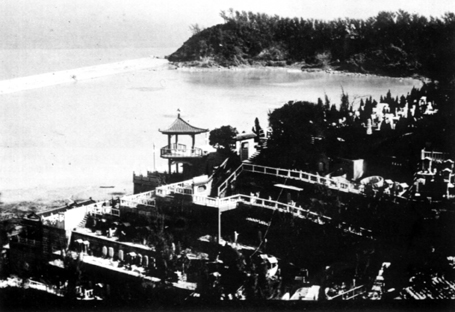 A view of the Taoist cemetery on Taipa showing its excellent location on the slope of a hill leading down to the edge of the sea.
A view of the Taoist cemetery on Taipa showing its excellent location on the slope of a hill leading down to the edge of the sea.
The prestige which the cemetery enjoys is due to several reasons, including the fact that families who acquire a plot, do so in perpetuity and do not have to dig up the bones later on. This prestige is quite easy to understand for somebody who appreciates the concept of feng shui. The huge area which the cemetery covers occupies a natural slope going down to the sea and faces east. It is protected from behind by a hill (popular mythology claims that this is a resting place, a kind of pillow) and enjoys a pleasant view of the sea.
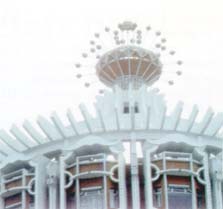 The "cosmic lantern" on the tower of the Hotel Lisboa.
The "cosmic lantern" on the tower of the Hotel Lisboa.
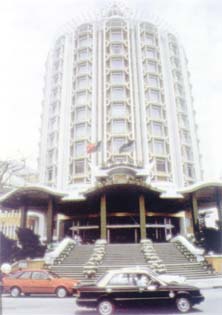 Stairway up to the main door of the Hotel Lisboa with a bat-like structure hanging over the entrance.
Stairway up to the main door of the Hotel Lisboa with a bat-like structure hanging over the entrance.
FENG SHUI AND THE HOTEL LISBOA
Another place in Macau which enjoys great renown is the Hotel and Casino Lisboa. It is famous not only in Macau but in all of Southeast Asia and in gambling circles worldwide. Millions of Hong Kong residents cross the Pearl River each year to try their luck on the 'Tables of Fortune'.
The main part of the hotel building is in the form of a cage and is referred to as such in Cantonese. Within the confines of this cage, much of Macau's money changes hands every day. The prestige of the hotel is also connected to its feng shui. Its design is unique and its location, on the corner of one of the land reclamation projects at Praia Grande Bay, gives it a special charm. In fact, the hotel was built in harmony with the precepts of feng shui right from the first stone to be laid.
For instance, the bat wings over the main door to the hotel are not there just for decoration. For the Chinese, the bat is a felicitous creature, the connection coming from the fact that fuk, the Cantonese word for bat, has the same pronunciation as the word for happiness. Thus the bat symbolizes happiness and, the most important contributor to happiness, money. This explains the presence of batshaped signs hanging at the entrance to pawn-brokers in Macau. The bat over the door at the Hotel Lisboa invites gamblers to bring in their money and thus contribute to the wealth of the casino owner.
The cage-shaped building traps the casino's clients into staying... but not for ever. The chain decoration surrounding the building on all floors is not completely closed. This is to give the gamblers the freedom to go back outside to stock up on a new supply of money before returning to the slot machines and gaming tables inside.
The entrance to the building is thought by some to represent the shape of a tiger. This vicious animal is not intended to harm the gamblers, however, but only their money. The building as a whole is assymetric, reflecting the two mythical animals, the tiger and the dragon. The green dragon dominates the sides of the building to the left of the entrance (to the right for somebody entering it), while the block to the right where the casino is located is dominated by the white tiger. The green dragon is associated with the east, daytime, and the positive pole while the white tiger is associated with the west, night and the negative pole.
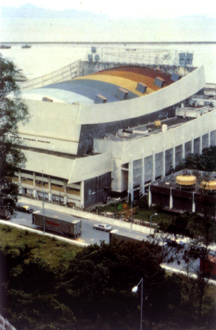
The Jai Alai building with its multi-coloured roof.
A RAINBOW ROOF
Another of Macau's casinos also has an interesting story connected to it. It is apparently well located next to the quay where visitors from Hong Kong arrive. In spite of the fact that its attractions include pelota, the Basque handball game, the Jai Alai casino has never enjoyed the same level of prosperity as the Hotel Lisboa. In fact, its fortune has been quite the opposite and right from the beginning it has been plagued by financial and management problems which have never been completely solved.
Speculation regarding the architectural qualities of the building has never ceased. The roof of the building is a strange shape, somewhat like parallel daggers, giving it an aggressive connotation. Furthermore, it was painted pink. After a certain period, negative events in the life of the company led somebody to suggest asking the advice of a geomancer. The geomancer was of the opinion that the pink roof could only have a negative effect as pink is the colour of a dead crab and as such can only have a bad influence.
The extent to which the geomancer's opinion was followed is hard to prove. What is known, however, is that after some time, the roof was painted a different colour. New difficulties arose and the geomancer was consulted yet again. He advised them to change the colour again and so the end result was both practical and modern - a rainbow-striped roof.
Another change was made to the building quite recently, in an attempt to boost its profitability. The door at the front of the facade was replaced by two side doors which are almost invisible. The popular explanation for this is that an evil spirit will not be able to find an exposed, unprotected entrance to the building.
WHEN IN ROME...
Many stories about feng shui are told by those born in Macau and those who come here to live. A Portuguese woman who has lived in the city for several years explained the fact that she increasingly takes heed of Chinese popular beliefs by saying, "When in Rome, do as the Romans do". She gave an interesting example of how she became aware of this assimilation:
"When I changed job recently, I went to work in an office which had something strange about it - all the people who had worked there before suffered serious problems. Either they had been sacked or they had got along so badly that they left.
So, on the basis of Chinese beliefs, I decided to change the way the furniture was arranged in the room. The Chinese believe that if a series of occupants of the same room have bad luck, then it is because the room itself has bad feng shui."
After consulting a feng shui master who visited the office, the lady tried to reduce as far as was possible the supposed bad influences in the room. The fact was that one of the windows looked directly onto the end of the Nobre de Carvalho bridge, in other words, a straight line was pointing directly into the window where one of the desks had usually been placed. As a result, the curtains were drawn permanently across the window and the desk was moved to a more suitable corner in accordance with the geomancer's recommendations.
Additionally, the room, which suffered from particularly unfavorable feng shui according to the geomancer, also faced the Hotel Lisboa building, which is supposed to radiate bad influences from the cupola on its dome. Apparently all the rooms which face the hotel-casino are affected by the pernicious presence of the building. To protect the room further, the lady in question was advised to place mirrors in her office in order to deflect the radiation of bad influences.
Another Portuguese lady who has lived in Macau has a very interesting story to tell concerning a period when she lived opposite one of Macau's temples, which according to Chinese superstitions, is a very unlucky location.
The living room in the apartment had a balcony which looked onto the temple, so whenever the Chinese maid had to hang out the washing, she went downstairs to the temple, prayed and lit incense beside the guardian lions. At first the Portuguese lady was unwilling to give any credence to the superstition and found the maid's concern amusing. Then she started having problems. While she lived in the building, she was involved in two crashes and the tension which plagued her eventually led to a nervous breakdown.
In connection with the problems which can arise from living near a temple, another Chinese supersition claims that it is unlucky to meet a monk, particularly on one's way to the casino. This seems to be explained by the fact that the saintliness of a monk can attract the grace of God, thus creating a vacuum around him. Alternatively, the onlooker may feel jealous of the monk's purity and feel ashamed of his own weaknesses thus creating a situation in which he is much more likely to succumb to bad luck.
(Taken from the book As Mil Faces da Lua Macau e o Feng-Shui by Luís Ortet, ed. ICM, 1988.)
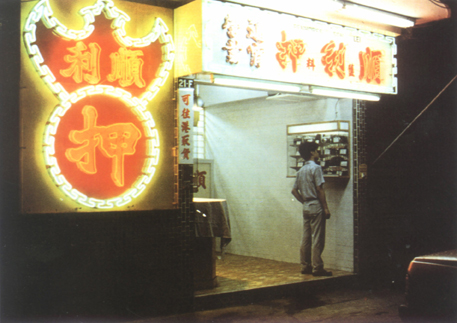
Neon sign at a pawnshop in Macau in the shape of a bat, symbol of luck.
* A professional journalist, Mr Ortet has lived in Macau since 1982. His main field of study is the paranormal sciences and esoteric traditions both in the East and the West and he has published several books on these subjects.
start p. 50
end p.